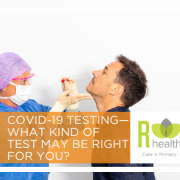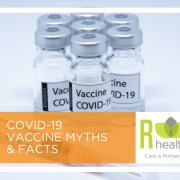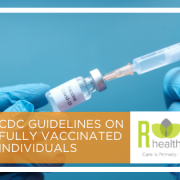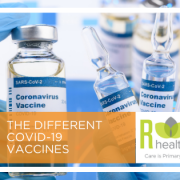COVID-19 TESTING—WHAT KIND OF TEST MAY BE RIGHT FOR YOU?
Since March 2020, COVID-19 testing has been evolving. Many people still have questions on tests, including what kind of test may be right for you?
Currently there are two kinds of diagnostic tests for COVID-19: PCR and antigen (rapid). The ideal time for any COVID-19 diagnostic test is 5-7 days after possible exposure, or shortly after symptoms develop. There is also one that looks for a past infection called an antibody test.
PCR test
The PCR test is often considered the “gold standard” test.
- PCR tests use a nasopharyngeal swab goes deep into your nose or to the back of your throat. Results may take 2 to 3 days or longer to come back.
- Sometimes it is too sensitive. If you are asymptomatic and you test positive with a PCR test, it may represent an infection that you had even as far back as two months ago. However, we need to act on it as if you were currently infected.
- While this test may take only 10 to 20 minutes to analyze, due to backlogs and testing delays, it may take up to a day to come back.
- This test is less sensitive than a PCR test which means if the probability is high that you have COVID-19 but test negative with an antigen test, you may be recommended to follow up with a PCR test anyway.
- One benefit of an antigen test is that if you are positive with an antigen test, you are most likely currently infectious.
- The main drawback of the antigen test is that if you test a little too early or a little too late, you may miss an active infection.
Antibody tests are blood tests that look for past infection and present antibodies conferring protection against repeated exposure to COVID-19. It is best to wait several weeks after an infection before testing for antibodies. However, antibody tests are not routinely recommended at this time since:
- Having antibodies does not necessarily mean that a person is immune. For example, a person may have been exposed to seasonal varieties of coronavirus (which circulate yearly in the United States and cause mild cold symptoms) which could possibly cause a false positive COVID-19 antibody test.
- Antibodies are sometimes not at a level high enough to be detected on the blood test, even when you have had COVID-19.













Leave a Reply
Want to join the discussion?Feel free to contribute!